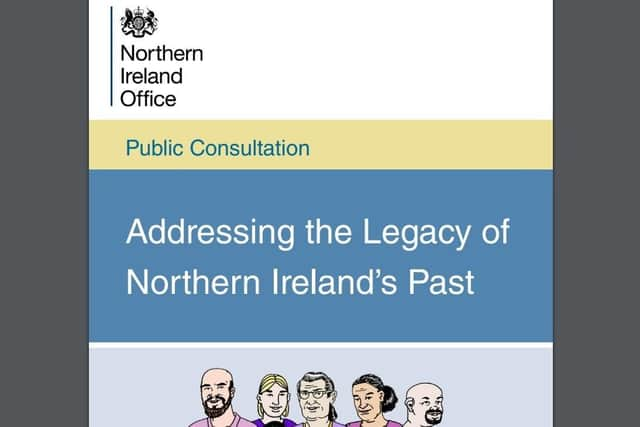Lawyers: Proposals to deal with the legacy of the Troubles pose threat to cardinal democratic freedoms


There was a very worrying perversion of police power in the 2018 proposals for ‘legacy’ investigation in Northern Ireland.
If allowed to go unchallenged it would have marked a drift into authoritarianism in Northern Ireland.
Advertisement
Hide AdAdvertisement
Hide AdNow the Northern Ireland Office has made an apparent change of direction in the Statement to Parliament of the Secretary of State on March 18.


It appears that the government does not wish to proceed with most of the institutions which were proposed by the Stormont House Agreement of December 2014 and which appeared in a draft Bill issued on May 11 2018 (‘the draft 2018 Bill’).
But the detail of what is now proposed is not clear and we are concerned that the danger remains that any new ‘legacy body’ will be granted undesirable ‘police powers’.
So we make the following suggestions which we hope will help to inform the debate.
Advertisement
Hide AdAdvertisement
Hide AdPolice officers have extensive powers over everyone. All officers must undergo rigorous training, are bound by a Code of Ethics and are subject to stringent police discipline.


These are protective measures designed to safeguard the citizen against abuse of police powers by police officers.
But the legacy legislation proposed for Northern Ireland in the draft 2018 Bill would have included:
• The conferral of police powers on people who were not police officers; and
Advertisement
Hide AdAdvertisement
Hide Ad• The conferral on these people of the power not only to investigate certain crimes but also to issue reports criticising individuals.


We go on to explain this in more detail.
The 2018 draft Bill had extensive provisions, including the establishment of an Historical Investigations Unit (HIU) which was not to be part of the Police Service of Northern Ireland (PSNI).
The HIU director would have had police powers and he/she would also have had the power to appoint HIU officers invested with such powers.
Armed with police powers the HIU would have been able to investigate (selected) ‘Troubles related deaths’ and then, where appropriate, would have prepared a report for the Public Prosecution Service (PPS) in which it would have identified anyone whom it believed to be a perpetrator of any criminal act.
Advertisement
Hide AdAdvertisement
Hide AdThus, the HIU would have been able to investigate not only acts of terrorism but also the actions of any member of the police or army whom the HIU believed had committed any crime: whether directly killing or wounding, or by ‘aiding and abetting’ the commission of crime, or by covering up a crime in the course of investigation of a Troubles-related death.
So far, this would have been straightforward.
The HIU with these police powers would have been able to satisfy the evident widespread political desire that perpetrators of crime (from wherever they come) should be identified and prosecuted. Of course, the decision as to whether or not to prosecute would not have rested with the HIU but, as in the case with all crime, with the independent PPS.
For a variety of reasons there might not have been many successful prosecutions. However, in the sense that the due procedures of the criminal law were properly carried out from investigation onwards, then justice would have been done, even if there were not many successful prosecutions.
It appears that the new proposals will include some form of ‘sifting’ process to identify cases which might merit the criminal investigation procedures being implemented. But it is not clear if such new criminal investigations will be carried out by the police – either PSNI or another police service – or by an HIU style body whose officers will have police powers, without being police officers of the PSNI or another police service.
Advertisement
Hide AdAdvertisement
Hide AdIn our view serious problems will arise if it is proposed to vest police powers in any new form of ‘HIU style’ body.
A major problem is that it is intended that the new body will – at least at the end of the process – issue a ‘family report’ to victims’ families.
In the case, of course, where a prosecution is to be brought, the new body will not be able to issue a family report until the conclusion of any court proceedings because of the danger of prejudice to the trial.
But in the case where there is not to be a prosecution (or where court proceedings have come to an end) it seems to us to be very worrying and problematic if the new body – if it were to have police powers – would be entitled to issue family reports which might identify anyone who was ‘believed’ to be a perpetrator (of any category).
Advertisement
Hide AdAdvertisement
Hide AdSuch a proposal, improperly in our view, would combine in the new body not only police powers but also the power to make adjudications or findings against individuals in its reports which it would issue to victims’ families.
To put it simply, the police have the right and duty of investigation and fact finding in respect of crime – for the purpose of making reports to the PPS. But the 2018 draft Bill in our view abused these by conferring also on the HIU the power to make adjudications against individuals, whether or not there is any allegation of any criminality.
It is only in a ‘police state’ that the police have such a role – designed to exclude the courts!
In this context we suggest that the recent, widely reported, judgment in the High Court in London in favour of a Mr Harry Miller is relevant.
Advertisement
Hide AdAdvertisement
Hide AdMr Miller was interviewed by the police following a complaint that he had engaged in Twitter in hate language in tweets on the transgender issue. The police recorded his tweets as constituting a ‘non-crime hate incident’ and then interviewed him, warning him that if he ‘escalated’ matters in his tweets they might take criminal action.
The judge gave careful, detailed consideration to the lawfulness of the police action under their ‘Hate Crime Operational Guidance’. He concluded that police had acted lawfully in their investigations, in the sense of intelligence gathering.
However, the judge then went on to hold that the actual police treatment of Mr Miller was unlawful, as he had not committed any crime and they had no basis for considering him even potentially guilty of any crime.
It seems to us that there are similarities here with the attempt in the 2018 draft Bill to vest the HIU with police powers and then to empower it to make findings against individuals who had not committed any crime and where the HIU had no proper basis (in the absence of a prosecution and conviction in court) for considering such individuals even potentially guilty of any crime.
Advertisement
Hide AdAdvertisement
Hide AdOf course, it is legitimate for society to require investigation of matters of public importance – such as legacy and, for instance, the RHI ‘problem’. But the investigation of such matters is properly carried out by a body such as the RHI tribunal which demonstrably included not only ‘due process’ but also transparency between the fact finding and the adjudication.
Other means of doing this are available – the RHI tribunal is not the only model – but what is not permissible, under the rule of law in a democratic society, is to vest in the police (or others such as the new body, if it is to be granted police powers) both the role of investigation and also the role of adjudication.
In essence in the Miller case the judge ruled that it was a perversion for the police to involve themselves with imputing blame to citizens who have not committed any crime and where the police have no basis for considering any citizen even potentially guilty of any crime.
The judge was not prepared to minimise the effect of the police turning up at Mr Miller’s place of work, when there was no evidence or grounds for suspecting that he had committed any criminal offence. He commented:
Advertisement
Hide AdAdvertisement
Hide Ad“The effect of the police turning up at Mr Miller’s place of work because of his political opinions must not be underestimated. To do so would be to undervalue a cardinal democratic freedom.
In this country we have never had a Cheka, a Gestapo or a Stasi. We have never lived in an Orwellian society.”
It is also noteworthy that the 2018 draft Bill (rightly) contained many protective and supportive provisions for victims and their families. But there were no equivalent protective and supportive provisions for anyone who might have been subject to the interrogation and exercise of police powers by the HIU.
There was no provision for legal advice, for access to documents, or for a right to adduce evidence or test the evidence allegedly supportive of the criticism of that individual. The point of all this is not only fairness for the individual – it provides checks and balances against the abuse of power by any investigator.
Advertisement
Hide AdAdvertisement
Hide AdThese shortcomings rendered what was proposed a gross violation of the maxim Audi alteram partem – a fundamental principle of justice requiring that no one may be judged to have done wrong without a fair hearing including a fair opportunity to challenge the evidence against them.
Readers will be familiar with the work of the RHI tribunal which has just recently issued its report. The tribunal demonstrably had a fair procedure for everyone who was a witness and might be subject to criticism. Why should anyone who might have been subject to criticism by the HIU, or anyone who might be subject to criticism from any new body, have a lesser protection of justice?
If there is any provision in the new proposals that the new body may include criticism of individuals in family reports without adequate defence rights, that also would constitute a breach of the European Convention on Human Rights.
The European Court of Human Rights has held that where publication compromises the integrity of the reputation of the person concerned there is a breach of Article 8 of the Convention.
Advertisement
Hide AdAdvertisement
Hide AdIn the case of Pfeifer v Austria (15 Nov. 2007) the Court declared that “a person’s right to protection of his or her reputation is encompassed by Article 8 as being part of the right to respect for private life.” See also Axel Springer AG v Germany (7 Feb. 2012).
This right was ignored in the 2018 draft Bill and it is of vital importance that that this gross error should not be repeated in the new proposals.
What, then, is now to be done?
We submit that the detail of the new proposals should, at least in important parts, be quite different from the draft 2018 Bill, as there were such serious legal problems with the proposals as set out in 2018.
We hope that the new proposals will:
• Duly respect the cardinal democratic freedoms identified by the judge in the Miller case
Advertisement
Hide AdAdvertisement
Hide Ad• Recognise the distinction between investigation and adjudication and ensure that these functions are separately carried out
• Respect judgments of the European Court of Human Rights
• Ensure that everyone who may be subject to criticism by any new body is be entitled to fair procedures from start to finish of any investigation
• Afford to everyone subject to investigation protective and supportive measures equivalent to those offered to victims and their families
• Neil Faris is a Belfast lawyer who has written extensively on legal defects in the Stormont House legacy plan and Peter Smith CBE QC joined the bar in 1969 and was a member of the Independent Commission on Policing in Northern Ireland (Patten)